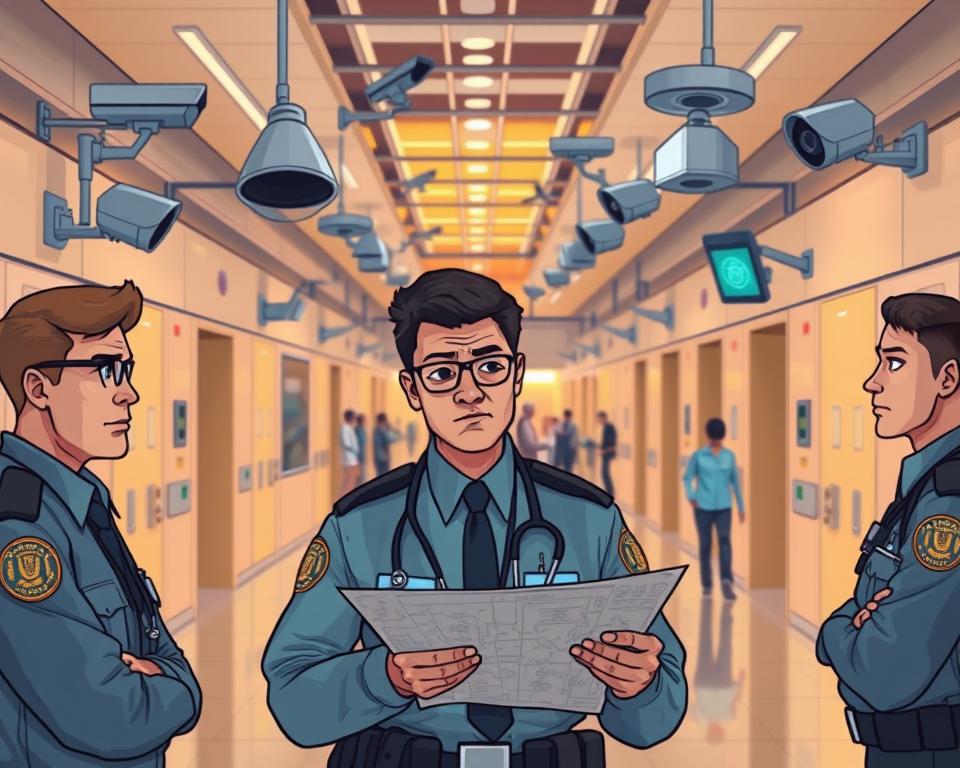Maximizing Safety with Hospital Security Guards
Can you imagine that hospitals deal with around 30 violent incidents per day? This startling data emphasizes how vital Hospital Security Guards are. They secure patients, employees, and sensitive information. In today’s fast-changing healthcare world, robust Healthcare Facility Security is key. It’s about creating safe spaces where patients can get care without fear of violence or data breaches.
Working closely with seasoned providers like Divine Protection Services boosts Medical Center Security Services. This ensures safety is always a top priority, without sacrificing access. This article examines how vehicle patrol security guards solutions and surveillance systems can significantly improve security protocols. It addresses both inside and outside dangers efficiently.

Key Insights
- Hospital Security Guards are essential for safeguarding patients, personnel, and confidential information.
- Healthcare Facility Security is essential to mitigate violent incidents and safeguard privacy.
- Integrated security solutions amplify the overall performance of hospital security services.
- Collaboration with firms like Divine Protection Services ensures tailored security solutions.
- Innovative technologies support modern medical facility security approaches.
- Managing openness and privacy is crucial for efficient hospital security standards.
Understanding the Need for Hospital Security
Hospital security is vital for protecting patients, employees, and private information. The uptick in violent incidents in hospitals demonstrates the demand for capable Hospital Security Guards. Such guards are crucial for sustaining a protected atmosphere and preserving the rights and dignity of all.
Enforcing robust Healthcare Facility Security plans is fundamental to stop violent behavior. This supports the creation of a compassionate space, elevating the patient and family experience. It additionally secures conformity with rules such as HIPAA, enforcing secure access to safeguard Protected Health Information (PHI). These practices not only shield patients but also cultivate trust between medical providers and their local communities.
| Security Measure Type | Value | Adherence to Rules |
|---|---|---|
| Access Control Systems | Limit unapproved entry and permissions | Crucial for HIPAA adherence |
| Surveillance Cameras | Monitor activities and deter criminal behavior | Supports regulatory requirements for safety |
| Emergency Response Plans | Provide quick responses to incidents | In line with emergency management and safety requirements |
| Training for Security Personnel | Equip staff with skills to handle crises | Meets required safety and security norms |
Putting funds into solid security systems and staff training is critical for defending hospitals and healthcare environments. These guidelines secure a protected and compliant setting, key to offering top-notch patient services.
Importance of Hospital Security Guards
Hospital security officers serve a crucial function in maintaining safety within medical centers. They guard access ways to block unapproved entry, respond to crises, and apply conflict management to forestall risks. With training from Divine Protection Services, they can spot and manage signs of agitation or violence.
Their visibility is crucial for ensuring the welfare of patients and employees. They safeguard the hospital’s functions, vital for a therapeutic atmosphere. By maintaining safety, they enhance the patient experience and minimize hazards.
High-Tech Tools for Hospital Security
Contemporary hospitals are turning to Advanced Technologies to strengthen their protection systems. Medical Center Security Services adeptly incorporate AI-powered cameras to elevate monitoring efficiency. Such cameras provide live tracking and analytics, allowing teams to detect and address risks promptly.
A fundamental part of Healthcare Security Solutions is utilizing access control systems. These solutions confine entry to restricted areas, ensuring that only sanctioned personnel can access crucial sections. By employing biometric authentication, hospitals can add an extra layer of security to patient information and valuable medical equipment.
AI-enhanced security systems are fundamental to physical protection. Facial scanning and conduct detection help security staff to act swiftly on security violations. High-level video analytics aids in operational choices, offering nonstop monitoring of hospital premises. This creates a safe atmosphere for patients and staff.
| Tech Tool | Deployment | Gains |
|---|---|---|
| AI-driven Surveillance | Real-time monitoring | Immediate threat identification |
| Access Control Systems | Regulated entry | Protection of sensitive areas |
| Facial Recognition | Biometric verification | Blocking illicit entry |
| Video Analytics | Operational oversight | Data-driven decision-making |
Advanced Technologies not only protect hospital assets but also contribute to creating a safe environment for all. By allocating resources to these innovative tools, medical centers can stay alert to security risks. This guarantees top-tier patient care.
Healthcare Facility Security Strategies
Robust Healthcare Facility Security tactics are necessary to secure patients, personnel, and visitors within medical facilities. Carrying out in-depth risk reviews is the bedrock of these methods. By detecting flaws, healthcare institutions can formulate specialized plans for various cases. This boosts their readiness for any incidents that may occur.
It’s important to foster the reporting of abnormal behaviors and threats. Medical centers need frameworks in place to react swiftly to those reports. This forward-thinking approach in Healthcare Facility Security fosters a culture of collective safety.
Overseeing guest access is a vital part of Medical Center Security Services. Ensuring only authorized individuals enter helps maintain a secure environment. Monitoring interactions between patients and healthcare professionals also minimizes risks. This creates a safer space for all. Here is a table summarizing essential parts of robust security strategies.
| Security Component | Overview | Advantages |
|---|---|---|
| Risk Assessments | Spotting weaknesses and evaluating potential hazards. | Improves preparedness and response times. |
| Incident Reporting | Prompting stakeholders to report odd conduct. | Supports quick reactions to dangers and boosts awareness. |
| Visitor Management | Procedures for overseeing and regulating facility entry. | Enhances security and reduces unauthorized access. |
| Staff Training | Ensuring staff receive comprehensive security training. | Enables personnel to manage security events adeptly. |
Training Security Personnel Effectively
Proper training of hospital security staff is critical for upholding safety in medical centers. Continuous education helps staff adapt to new challenges. It further enhances their capacity to react effectively in varied scenarios.
‘Divine Protection Services’ emphasizes developing strong situational awareness in security personnel. This involves acquiring de-escalation abilities for stressful engagements. Frequent drills and mock scenarios strengthen procedures. Teams are trained to address dangers effectively while preserving dignity and respect.
This approach to training security personnel goes beyond defensive practices. It encourages a climate of safety and professionalism across healthcare facilities. By emphasizing essential skills, medical centers guarantee their security staff can face threats competently.
Compliance with Regulatory Standards
Compliance with Regulatory Standards is essential for healthcare facilities aiming to ensure security and trust. For example, HIPAA mandates stringent access controls to safeguard Patient Health Information (PHI). These protocols prevent unauthorized access and breaches of sensitive data.
Hospitals can strengthen their compliance by instituting detailed protocols. They comprise frequent evaluations, staff development, and unambiguous incident reporting workflows. Such measures not only protect patient safety but also build community trust.
Companies like Divine Protection Services offer specialized compliance strategies for healthcare facilities. Their experience in Hospital Security Services confirms that security officers are equipped to comply with regulations.
Dedication to compliance lowers risks and forges reliable patient-provider connections. A proactive view on regulations aids the entire healthcare infrastructure.
Hospital Security Officers in Practice
Hospital Security Guards are crucial for protecting medical environments. Their duties are evident in various real-world instances, demonstrating a forward-thinking approach. For instance, they oversee disputes in waiting rooms, swiftly settling them to avert escalation.
In tense moments, these officers escort individuals to safe places, supporting them in their time of need. This step protects vulnerable individuals and fosters a tranquil environment. Their teamwork with law enforcement in emergencies emphasizes the value of Professional Healthcare Security. They often serve as the first line of response.
Instruction from Divine Protection Services equips these guards to manage crises effectively. They acquire skills to uphold policies while maintaining respect for all. This combination of authority and empathy makes them key members of the healthcare team. They strive to guarantee protection and security for all individuals in the facility.
Customizing Security Solutions for Healthcare Facilities
Healthcare facilities face unique security challenges that demand a tailored approach. Tailoring Security Solutions is essential for confronting these matters, ensuring safety for both patients and staff. Teaming up with authorities such as Divine Protection Services makes it possible for hospitals to craft security strategies matching their individual needs.
An all-encompassing security framework includes key topics like violence control and pharmaceutical security. By leveraging cutting-edge technology, hospitals can improve their security approaches while meeting HIPAA requirements. This frequently encompasses visitor oversight systems and responsive access control methods tailored to evolving needs.
The function of Medical Facility Guards is equally important. They benefit from targeted training to deal with security episodes and ensure sustained vigilance. Their presence fends off risks and comforts both staff and patients.
The following table demonstrates how Personalizing Security Solutions tackles diverse healthcare issues:
| Security Concern | Custom Solution |
|---|---|
| Violence Prevention | Training for Medical Facility Guards in de-escalation techniques |
| Medication Security | Setting up protected drug cabinets and surveillance solutions |
| Visitor Management | Sophisticated guest screening and ID badge protocols |
| Access Control | Adaptive access control systems that adjust based on facility activity |
With thorough planning and forging alliances with the right experts, healthcare facilities can form a resilient security posture. This stems from Adapting Security Solutions to their distinctive demands. Merging human supervision with tech tools greatly enhances protection, resulting in a safer, more efficient medical environment.
In Closing
Securing the safety and health of patients, personnel, and confidential data is critical in hospitals. Hospital Security Guards currently leverage state-of-the-art technology and education to address modern dangers. This advancement not only shields physical premises but also strengthens trust between patients and healthcare professionals.
Tailored Healthcare Security Solutions enable hospitals to lead in the evolving security environment. Partnering with experienced firms like Divine Protection Services equips healthcare facilities to handle safety concerns effectively. By blending personnel training with cutting-edge technology, hospitals can foster a secure environment for healing and care.
The health sector grapples with escalating risks, making professional security steps vital. Hospitals have to integrate these progressing strategies to fortify their environments and uphold operational honor.


